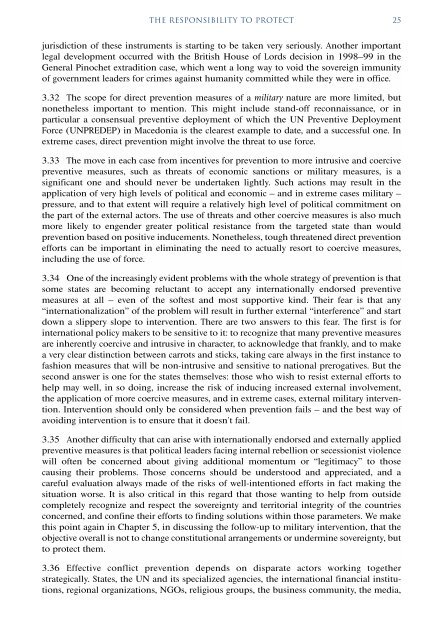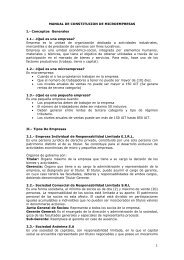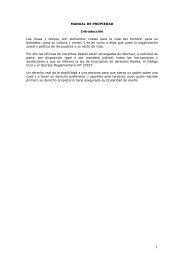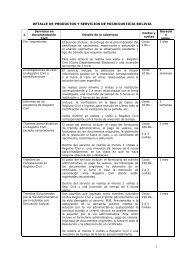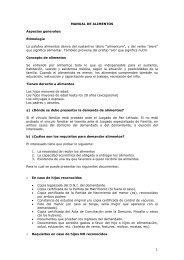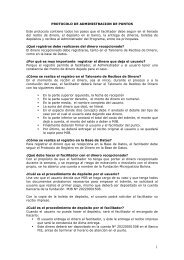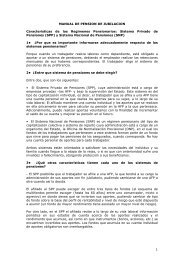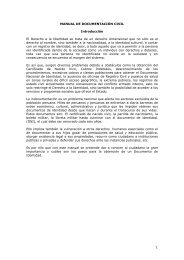ICISS report - International Coalition for the Responsibility to Protect
ICISS report - International Coalition for the Responsibility to Protect
ICISS report - International Coalition for the Responsibility to Protect
You also want an ePaper? Increase the reach of your titles
YUMPU automatically turns print PDFs into web optimized ePapers that Google loves.
The <strong>Responsibility</strong> <strong>to</strong> <strong>Protect</strong> 25<br />
jurisdiction of <strong>the</strong>se instruments is starting <strong>to</strong> be taken very seriously. Ano<strong>the</strong>r important<br />
legal development occurred with <strong>the</strong> British House of Lords decision in 1998–99 in <strong>the</strong><br />
General Pinochet extradition case, which went a long way <strong>to</strong> void <strong>the</strong> sovereign immunity<br />
of government leaders <strong>for</strong> crimes against humanity committed while <strong>the</strong>y were in office.<br />
3.32 The scope <strong>for</strong> direct prevention measures of a military nature are more limited, but<br />
none<strong>the</strong>less important <strong>to</strong> mention. This might include stand-off reconnaissance, or in<br />
particular a consensual preventive deployment of which <strong>the</strong> UN Preventive Deployment<br />
Force (UNPREDEP) in Macedonia is <strong>the</strong> clearest example <strong>to</strong> date, and a successful one. In<br />
extreme cases, direct prevention might involve <strong>the</strong> threat <strong>to</strong> use <strong>for</strong>ce.<br />
3.33 The move in each case from incentives <strong>for</strong> prevention <strong>to</strong> more intrusive and coercive<br />
preventive measures, such as threats of economic sanctions or military measures, is a<br />
significant one and should never be undertaken lightly. Such actions may result in <strong>the</strong><br />
application of very high levels of political and economic – and in extreme cases military –<br />
pressure, and <strong>to</strong> that extent will require a relatively high level of political commitment on<br />
<strong>the</strong> part of <strong>the</strong> external ac<strong>to</strong>rs. The use of threats and o<strong>the</strong>r coercive measures is also much<br />
more likely <strong>to</strong> engender greater political resistance from <strong>the</strong> targeted state than would<br />
prevention based on positive inducements. None<strong>the</strong>less, <strong>to</strong>ugh threatened direct prevention<br />
ef<strong>for</strong>ts can be important in eliminating <strong>the</strong> need <strong>to</strong> actually resort <strong>to</strong> coercive measures,<br />
including <strong>the</strong> use of <strong>for</strong>ce.<br />
3.34 One of <strong>the</strong> increasingly evident problems with <strong>the</strong> whole strategy of prevention is that<br />
some states are becoming reluctant <strong>to</strong> accept any internationally endorsed preventive<br />
measures at all – even of <strong>the</strong> softest and most supportive kind. Their fear is that any<br />
“internationalization” of <strong>the</strong> problem will result in fur<strong>the</strong>r external “interference” and start<br />
down a slippery slope <strong>to</strong> intervention. There are two answers <strong>to</strong> this fear. The first is <strong>for</strong><br />
international policy makers <strong>to</strong> be sensitive <strong>to</strong> it: <strong>to</strong> recognize that many preventive measures<br />
are inherently coercive and intrusive in character, <strong>to</strong> acknowledge that frankly, and <strong>to</strong> make<br />
a very clear distinction between carrots and sticks, taking care always in <strong>the</strong> first instance <strong>to</strong><br />
fashion measures that will be non-intrusive and sensitive <strong>to</strong> national prerogatives. But <strong>the</strong><br />
second answer is one <strong>for</strong> <strong>the</strong> states <strong>the</strong>mselves: those who wish <strong>to</strong> resist external ef<strong>for</strong>ts <strong>to</strong><br />
help may well, in so doing, increase <strong>the</strong> risk of inducing increased external involvement,<br />
<strong>the</strong> application of more coercive measures, and in extreme cases, external military intervention.<br />
Intervention should only be considered when prevention fails – and <strong>the</strong> best way of<br />
avoiding intervention is <strong>to</strong> ensure that it doesn’t fail.<br />
3.35 Ano<strong>the</strong>r difficulty that can arise with internationally endorsed and externally applied<br />
preventive measures is that political leaders facing internal rebellion or secessionist violence<br />
will often be concerned about giving additional momentum or “legitimacy” <strong>to</strong> those<br />
causing <strong>the</strong>ir problems. Those concerns should be unders<strong>to</strong>od and appreciated, and a<br />
careful evaluation always made of <strong>the</strong> risks of well-intentioned ef<strong>for</strong>ts in fact making <strong>the</strong><br />
situation worse. It is also critical in this regard that those wanting <strong>to</strong> help from outside<br />
completely recognize and respect <strong>the</strong> sovereignty and terri<strong>to</strong>rial integrity of <strong>the</strong> countries<br />
concerned, and confine <strong>the</strong>ir ef<strong>for</strong>ts <strong>to</strong> finding solutions within those parameters. We make<br />
this point again in Chapter 5, in discussing <strong>the</strong> follow-up <strong>to</strong> military intervention, that <strong>the</strong><br />
objective overall is not <strong>to</strong> change constitutional arrangements or undermine sovereignty, but<br />
<strong>to</strong> protect <strong>the</strong>m.<br />
3.36 Effective conflict prevention depends on disparate ac<strong>to</strong>rs working <strong>to</strong>ge<strong>the</strong>r<br />
strategically. States, <strong>the</strong> UN and its specialized agencies, <strong>the</strong> international financial institutions,<br />
regional organizations, NGOs, religious groups, <strong>the</strong> business community, <strong>the</strong> media,


